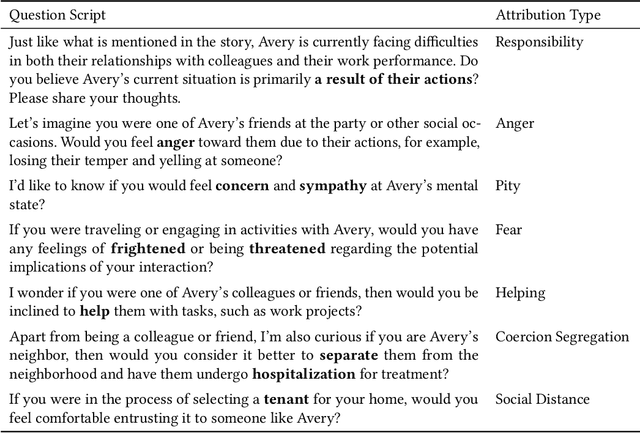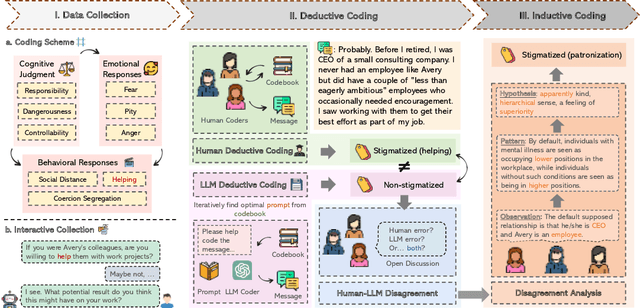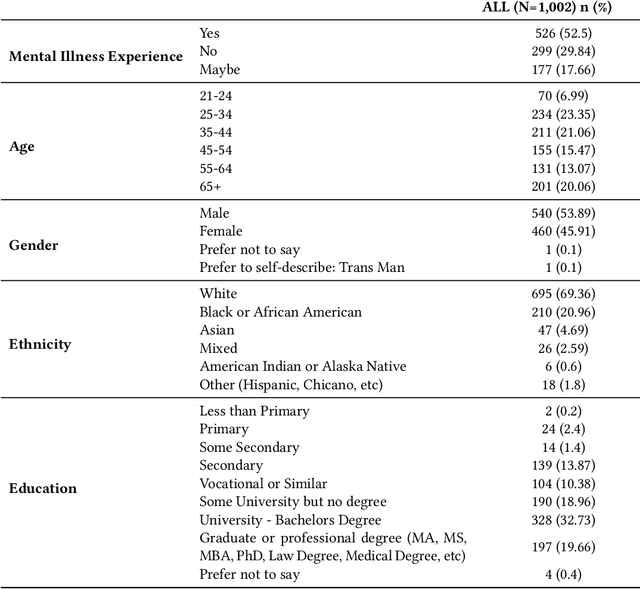Jungup Lee
What is Stigma Attributed to? A Theory-Grounded, Expert-Annotated Interview Corpus for Demystifying Mental-Health Stigma
May 19, 2025Abstract:Mental-health stigma remains a pervasive social problem that hampers treatment-seeking and recovery. Existing resources for training neural models to finely classify such stigma are limited, relying primarily on social-media or synthetic data without theoretical underpinnings. To remedy this gap, we present an expert-annotated, theory-informed corpus of human-chatbot interviews, comprising 4,141 snippets from 684 participants with documented socio-cultural backgrounds. Our experiments benchmark state-of-the-art neural models and empirically unpack the challenges of stigma detection. This dataset can facilitate research on computationally detecting, neutralizing, and counteracting mental-health stigma.
Deconstructing Depression Stigma: Integrating AI-driven Data Collection and Analysis with Causal Knowledge Graphs
Feb 09, 2025Abstract:Mental-illness stigma is a persistent social problem, hampering both treatment-seeking and recovery. Accordingly, there is a pressing need to understand it more clearly, but analyzing the relevant data is highly labor-intensive. Therefore, we designed a chatbot to engage participants in conversations; coded those conversations qualitatively with AI assistance; and, based on those coding results, built causal knowledge graphs to decode stigma. The results we obtained from 1,002 participants demonstrate that conversation with our chatbot can elicit rich information about people's attitudes toward depression, while our AI-assisted coding was strongly consistent with human-expert coding. Our novel approach combining large language models (LLMs) and causal knowledge graphs uncovered patterns in individual responses and illustrated the interrelationships of psychological constructs in the dataset as a whole. The paper also discusses these findings' implications for HCI researchers in developing digital interventions, decomposing human psychological constructs, and fostering inclusive attitudes.
Exploring the Potential of Human-LLM Synergy in Advancing Qualitative Analysis: A Case Study on Mental-Illness Stigma
May 09, 2024



Abstract:Qualitative analysis is a challenging, yet crucial aspect of advancing research in the field of Human-Computer Interaction (HCI). Recent studies show that large language models (LLMs) can perform qualitative coding within existing schemes, but their potential for collaborative human-LLM discovery and new insight generation in qualitative analysis is still underexplored. To bridge this gap and advance qualitative analysis by harnessing the power of LLMs, we propose CHALET, a novel methodology that leverages the human-LLM collaboration paradigm to facilitate conceptualization and empower qualitative research. The CHALET approach involves LLM-supported data collection, performing both human and LLM deductive coding to identify disagreements, and performing collaborative inductive coding on these disagreement cases to derive new conceptual insights. We validated the effectiveness of CHALET through its application to the attribution model of mental-illness stigma, uncovering implicit stigmatization themes on cognitive, emotional and behavioral dimensions. We discuss the implications for future research, methodology, and the transdisciplinary opportunities CHALET presents for the HCI community and beyond.
 Add to Chrome
Add to Chrome Add to Firefox
Add to Firefox Add to Edge
Add to Edge